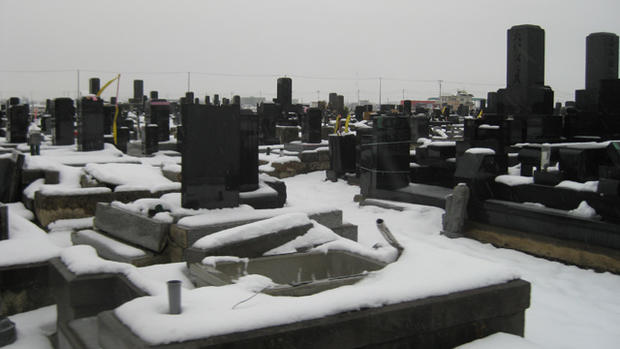Japan still recovering a year after tsunami
(CBS News) SENDAI, Japan - It was a Friday afternoon in Japan -- one year ago this weekend -- when the earthquake struck. The tsunami it triggered killed at least 16,000. Even now, 3,000 are still missing. For survivors, life is forever changed. CBS News correspondent Bill Whitaker covered the disaster and went back to the city of Sendai.
Shoji Yamada can manage a smile these days. It's taken almost a year. The 65-year old farmer lost three members of his family, his house and rice paddies in the tsunami. He lives now on social security in cramped temporary housing.
When he's by himself, he told us, he still cries. So he goes out with friends to laugh and forget for a while.
A year ago in a Sendai evacuation center, he couldn't stop crying. He'd just learned his grandsons -- 4-year-old Yutaro, 3-year-old Junnosuke, and their mother Fusae -- had been swept away by the tsunami.
The wave that swept in off the Pacific was 25 feet high when it washed over Sendai, laying waste to everything in its path. About 779 people died here. The destruction was so massive, Japan has spent the last year mostly cleaning up. What's left is lifeless ruins.
Japanese town haunted by loss year after tsunami
How the Japanese tsunami changed the auto industry
Along 400 miles of Japan's northeast coast -- in some places reaching three miles inland -- the scar of the tsunami is still raw. About 100,000 people still live in temporary housing. The saltwater has left more than 58,000 acres of farmland and rice paddies unusable.
What continues to grow all along the coast: Mountains of debris -- 22 million tons of it. They're an inescapable reminder of what was lost and the most tangible sign of what's been accomplished in a year since the disaster: the reclaiming of the land.
Yutaka Kumagai represents Sendai in the Diet, Japan's congress. When we met him a year ago he seemed in shock -- he'd lost two relatives in the tsunami. "It's like Hiroshima after atomic bomb," he said in 2011.
He joined the majority in the Diet and passed a $235 billion, five-year recovery plan.
"Is that enough?" Whitaker asked him
"I don't think so, I don't think so," he said.
As he surveys his wrecked district, Kumagai admits the task of rebuilding is daunting. His constituents are growing discouraged at the slow progress. Still, they encourage him.
"They give me energy," Kumagai said. "and, you know...'Hey, you have to hold on and hang in there to make a better plan.'"
"So they're trying to cheer you up?"Whitaker asked.
"That's right. But it makes me really sad, because I know they are laughing to keep from crying."
Shoji Yamada says he'll get a loan and, with the help of his son, rebuild his house. In many ways he's like his country a year after the tsunami -- determined to recover, trying not to cry.

